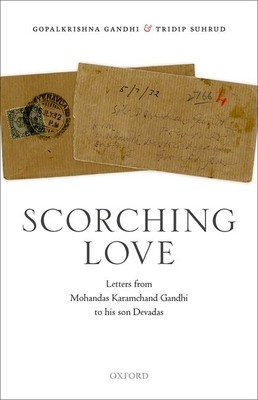
- We will send in 10–14 business days.
- Author: Gopalkrishna Gandhi
- Publisher: Oxford University Press (UK)
- ISBN-10: 0192858386
- ISBN-13: 9780192858382
- Format: 14.5 x 20.6 x 4.8 cm, kieti viršeliai
- Language: English
- SAVE -10% with code: EXTRA
Reviews
Description
This book publishes - for the most part, for the first time - Gandhi's letters to his youngest son, Devadas from 1914, when father and son were both in South Africa to 1948, when they were both in Delhi, the capital of free India where within hours of the last letter Gandhi was assassinated.
Gandhi wrote these letters by day, he wrote them by night, he wrote them from aboard trains, steamers, both right and left hands being pressed into service to rest one when tired out.
The letters span three decades during which the writer grew from being a fighter for the rights of Indians in South Africa to being hailed as Father of the Nation by millions in India and - opposed by many as well including the man who felled him by three bullets fired at point blank range on 30
January, 1948. The letters hold his aspirations for his son and for his nation. They bear great love and they also scorch. And we see Devadas, the recipient of the letters, move in them from compliant childhood and youth, to adulthood, questioning and remonstrating with his father and being just the
independent son his father wants him to be.
EXTRA 10 % discount with code: EXTRA
The promotion ends in 23d.11:02:14
The discount code is valid when purchasing from 10 €. Discounts do not stack.
- Author: Gopalkrishna Gandhi
- Publisher: Oxford University Press (UK)
- ISBN-10: 0192858386
- ISBN-13: 9780192858382
- Format: 14.5 x 20.6 x 4.8 cm, kieti viršeliai
- Language: English English
This book publishes - for the most part, for the first time - Gandhi's letters to his youngest son, Devadas from 1914, when father and son were both in South Africa to 1948, when they were both in Delhi, the capital of free India where within hours of the last letter Gandhi was assassinated.
Gandhi wrote these letters by day, he wrote them by night, he wrote them from aboard trains, steamers, both right and left hands being pressed into service to rest one when tired out.
The letters span three decades during which the writer grew from being a fighter for the rights of Indians in South Africa to being hailed as Father of the Nation by millions in India and - opposed by many as well including the man who felled him by three bullets fired at point blank range on 30
January, 1948. The letters hold his aspirations for his son and for his nation. They bear great love and they also scorch. And we see Devadas, the recipient of the letters, move in them from compliant childhood and youth, to adulthood, questioning and remonstrating with his father and being just the
independent son his father wants him to be.


Reviews